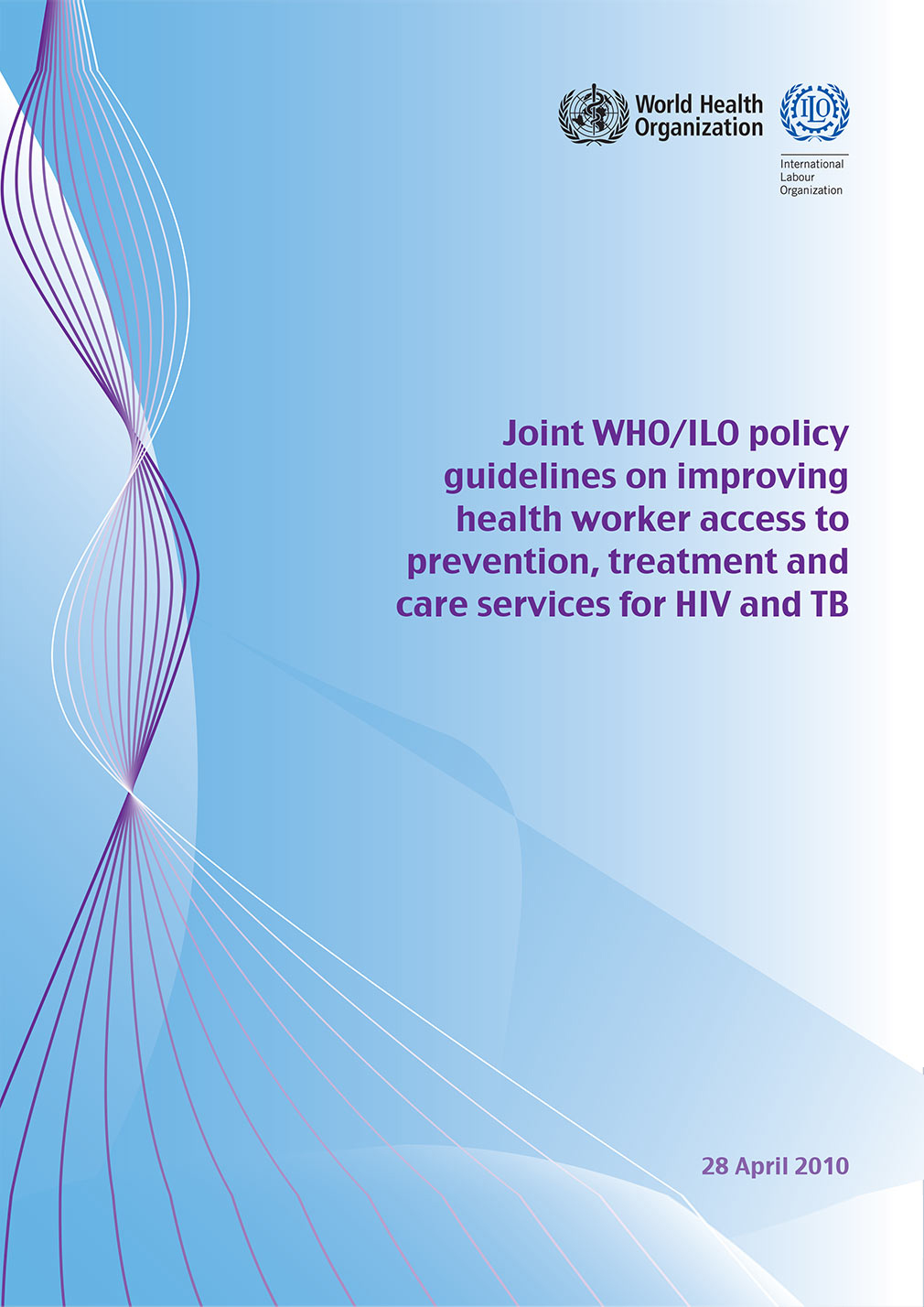مسار التنقل
- الرئيسية
- منصة منظمة الصحة العالمية لتبادُل المعارف بشأن السل
- المبادئ التوجيهية الموحدة
- Module 6: Comorbidities
- Module 6: Joint WHO/ILO policy guidelines on improving health worker access to prevention, treatment and care services for HIV and TB
Module 6: Joint WHO/ILO policy guidelines on improving health worker access to prevention, treatment and care services for HIV and TB
- Abbreviations, Acronyms and Selected Definitions
- Executive Summary
- 1. Introduction
- 2. Statements and Recommendations
- 3. Integrating framework and implementation plan
- References
- Annex 1: WHO and other international guidelines referenced
- Annex 2: Follow-up and implementation; an Extract from the Report: International consultation policy guidelines on improving health workers' access to prevention, treatment and care services for HIV and TB 14-16 September 2009, WHO/Geneva (pp 41-46)
كتاب روابط اجتياز لـ 1266
Module 6: Joint WHO/ILO policy guidelines on improving health worker access to prevention, treatment and care services for HIV and TB
جدول المحتويات (النسخة الإلكترونية) :
- Abbreviations, Acronyms and Selected Definitions
- Executive Summary
- 1. Introduction
-
2. Statements and Recommendations
- 2.1 Statement #1
-
2.2 Statement #2
- 2.2.1 Introduce new, or reinforce existing, policies that prevent discrimination against health workers with HIV or TB, and adopt interventions aimed at stigma reduction among colleagues and supervisors.
- 2.2.2 Key References and Supporting WHO Guidelines
- 2.2.3 Table 4: Recommendation for Statement 2
- 2.3 Statement #3
- 2.4 Statement #4
-
2.5 Statement #5
- 2.5.1 In conjunction with health workers’ representatives, develop and implement programmes for regular, free, voluntary, and confidential counselling and testing for HIV and TB, including addressing sexual and reproductive health issues, as well as intensified case finding in the families of health workers with TB.
- 2.5.2 Key References and Supporting WHO Guidelines
- 2.5.3 Table 7: Recommendation for Statement 5
-
2.6 Statement #6
- 2.6.1 Develop and implement training programmes for pre-service, in-service and continuing education on TB and HIV prevention, treatment and care services, integrating with existing programmes and including managers and worker representatives as well as health workers.
- 2.6.2 Key References and Supporting WHO Guidelines
- 2.6.3 Table 8: Recommendation for Statement 6
-
2.7 Statement #7
- 2.7.1 Disseminate policies in the form of guidelines and codes of practices for application at the level of health facilities, and ensure provision of budgets for the training and material inputs to make them operational.
- 2.7.2 Key References and Supporting WHO Guidelines
- 2.7.3 Table 9: Recommendation for Statement 7
- 2.8 Statement #8
- 2.9 Statement #9
-
2.10 Statement #10
- 2.10.1 Provide universal availability of free and timely PEP to all health care providers, for both occupational and non-occupational exposures, with appropriate training of counsellors and information on the benefits and risks provided to all staff.
- 2.10.2 Key References and Supporting WHO Guidelines
- 2.10.3 Table 14: Recommendation for Statement 10
-
2.11 Statement #11
- 2.11.1 Provide free HIV and TB treatment for health workers in need, facilitating the delivery of these services in a non-stigmatizing, gendersensitive, confidential, and convenient setting even where there is no staff clinic, and/or the health worker’s own facility does not offer ART.
- 2.11.2 Key References and Supporting WHO Guidelines
- 2.11.3 Table 15: Recommendation for Statement 11
-
2.12 Statement #12
- 2.12.1 In the context of preventing co-morbidity, provide universal availability of a comprehensive package of prevention and care for all HIV positive health workers, including IPT and CTX prophylaxis, with appropriate information on the benefits and risks
- 2.12.2 Key References and Supporting WHO Guidelines
- 2.12.3 Table 16: Recommendation for Statement 12
-
2.13 Statement #13
- 2.13.1 Establish schemes for reasonable accommodation and compensation, including, as appropriate, paid leave, early retirement benefits and death benefits in the event of occupationally-acquired disease.
- 2.13.2 Key References and Supporting WHO Guidelines
- 2.13.3 Table 17: Recommendation for Statement 13
-
2.14 Statement #14
- 2.14.1 Develop and implement mechanisms for monitoring the availability of these TREAT policy guidelines at the national level, as well as the dissemination of these policies and their application in the healthcare setting.
- 2.14.2 Key References and Supporting ILO and WHO Guidelines
- 2.14.3 Table 18: Recommendation for Statement 14
- 3. Integrating framework and implementation plan
- References
- Annex 1: WHO and other international guidelines referenced
- Annex 2: Follow-up and implementation; an Extract from the Report: International consultation policy guidelines on improving health workers' access to prevention, treatment and care services for HIV and TB 14-16 September 2009, WHO/Geneva (pp 41-46)
Suggested citation. Joint WHO/ILO policy guidelines on improving health worker access to prevention, treatment and care services for HIV and TB. Geneva: World Health Organization; 2010.

 تعليق
تعليق